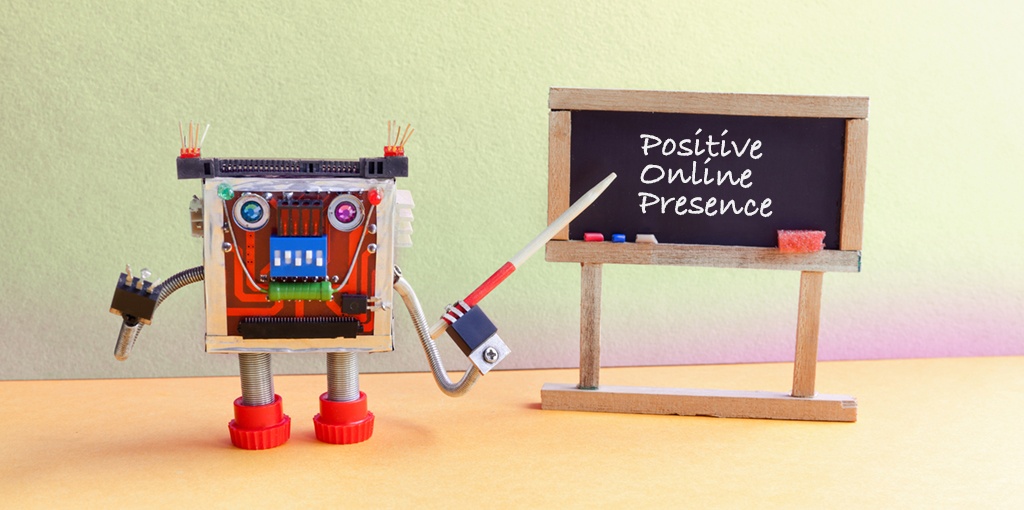
In an age where we communicate online more than ever before, it’s important to be aware of the footprint you’ve left behind on the web. Social media has the power to be a positive social and professional outlet, but only with responsible use. As important as it is for everyone to be mindful of their online footprint, it’s especially important to teach the next generation how to carefully curate their online presence.
With this in mind, here are five simple ingredients for creating a positive online presence:
- Make It Secure: One of the easiest ways to take control of your online presence is to make sure all of your accounts are secure. Start by creating a strong password that is unique to each account and can’t be easily guessed.
If the account offers any form of two-factor authentication, turn it on! Having this setting on will result in an SMS code being sent to your phone number for you to enter on the login page after your password. Yes, it will take an extra couple of seconds to log in, but you won’t regret this backup security measure if someone tries to hack your account.
Although SMS two-factor authentication is better than no secondary authentication, it’s still possible for hackers to hijack your phone’s SIM card and intercept the code that’s sent to you. If you want to assure that your accounts are secure, consider downloading a two-factor authentication app. This method is similar to the SMS two-factor authentication process, but it is initiated through an app that isn’t as vulnerable to hacking.
- Keep It Professional: Students are well aware that potential future employers can see what they post online, so they often try to minimize their digital footprint in order to not risk losing opportunities in the future.
Although making sure you’re only sharing what’s appropriate is an important part of being professional online, it’s also important to actually be sharing things. Specifically, you should work to curate your achievements online in a professional space, such as a blog or portfolio filled with writing, visual work, or links to your educational achievements and awards. This will create a positive online footprint for future employers to explore, demonstrating that you have both the skills shown in your work and the ability to creatively present your work to others.
- Stay Safe: The basic tenets of staying safe online will always be true: don’t post personal information, don’t click on anything suspicious, and speak up if you feel unsure about something. Students have been learning these important safety practices for years, but they still sometimes fail to consistently implement them in their online space.
For example, on platforms such as Instagram and Twitter, social media “success” is marked by the number of followers and likes. The goal to have the most likes and followers can lead children to leave their accounts open to the public, which makes them vulnerable to unsafe monitoring and harassment from people they don’t know.
Although public accounts can be perfectly safe, it’s important to use them wisely. Be aware of who is following you, and if someone unusual tries to follow or message you, make sure to block his or her account. Additionally, an often-overlooked safety hazard with public social accounts is the ability to tag your location in posts. This is only safe as long as you are no longer at that specific location—and as long as it isn’t somewhere you visit often, such as your school, dance studio, or apartment complex.
- Be Respectful: It may go without saying, but one of the key ingredients to a positive online presence is simply being a good person online. For younger generations, the internet has become a place of substantial communication, both positive and negative.
Everyone knows that the internet is permanent, but that doesn’t make cyberbullying any less prevalent. This is partially because of how easy it is to be confrontational online—without having to say things to someone’s face—so people often feel less guilty about being disrespectful to others.
It’s important to remember that not only are your online words there forever, but they also carry the same impact they would if you said them in real life.
- Enjoy in Moderation: As fun as it might be to use social media, communicate with friends online, and surf the web, the key to keeping your online presence positive is limiting your time spent in the digital world. There are a million reasons why too much screen time can be unhealthy, but the most important reason to limit your online presence is to focus on natural experiences and relationships in the real world.
Keep track of the time you’ve spent on your devices by downloading an app that monitors your device usage, or keep track of your phone's native monitoring system. By being mindful of your time online and minimizing it as much as possible, you will likely find that you’ll become less stressed and more productive!
As big of a role technology has established in our lives, it’s still important to take control of the way that we use it on a daily basis. Working to create a positive online presence will help you form a healthy relationship with technology and allow you to use it for its best purposes, such as communicating with friends and family as well as sharing professional and educational achievements.
Creating a positive online presence is important for everyone—make sure to share these tips with your students, colleagues, and family. If you liked these suggestions, be sure to subscribe to the Educator blog for more helpful teaching tips all year long!





